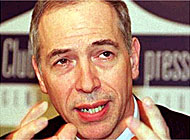Financial experts conclude Lausanne conference

Experts from nine countries met in Lausanne this week for the second time to discuss assets looted by government leaders.
The meeting focused on the return of illegal funds deposited in banks and other institutions to their country of origin.
“This conference allowed us to have a very detailed exchange of experiences and ideas,” said Jacques de Watteville of the Swiss foreign ministry. “It contributed to raising awareness about the different kinds of problems that arise in this kind of situation.”
The Swiss are trying to develop a method for the return of funds that could be used as a precedent for other cases involving illicit funds. “In our view, such funds should be repatriated to their country of origin, as we have already done in some cases,” de Watteville told swissinfo on Thursday.
There is currently no international law governing the restitution of looted funds, and many countries have no legal basis that covers this contingency.
While no concrete results emerged from the two-day meeting, Swiss officials feel some progress was made. “I had the feeling there is a global evolution in thinking here, and other countries are now considering they should adapt their legislation to reach the same goals as us,” said de Watteville.
None of the countries taking part in the meeting – Britain, Canada, France, Germany, Italy, Japan, Jersey, Luxembourg, the United States and Switzerland – is interested in creating a new international crime body to deal with issue though.
Relying on task force
“The feeling is that the existing international Financial Action Task Force would be an appropriate organisation to implement any new measures,” de Watteville told swissinfo. The FAFT was instituted to fight money laundering in 1989 and Switzerland is one of 31 member states.
Last January, financial representatives had already met in Lausanne to exchange ideas on preventing corrupt rulers from depositing illicit money in financial centres. They also discussed possible ways to trace and seize such accounts.
Attempts made by the Swiss several years ago to stop the flow of illicit funds into the country’s banks failed.
The Foreign Ministry asked for international cooperation in fighting financial crime following a highly publicised case involving funds deposited by the late dictator of the Philippines, Ferdinand Marcos, in the 1980s.
The illicit funds issue was also in the spotlight after deposits of about $700 million were discovered in Swiss bank accounts of the deceased Nigerian dictator Sani Abacha. The money was apparently part of $3 billion taken illegally from Nigeria.
swissinfo with agencies

In compliance with the JTI standards
More: SWI swissinfo.ch certified by the Journalism Trust Initiative
You can find an overview of ongoing debates with our journalists here. Please join us!
If you want to start a conversation about a topic raised in this article or want to report factual errors, email us at english@swissinfo.ch.